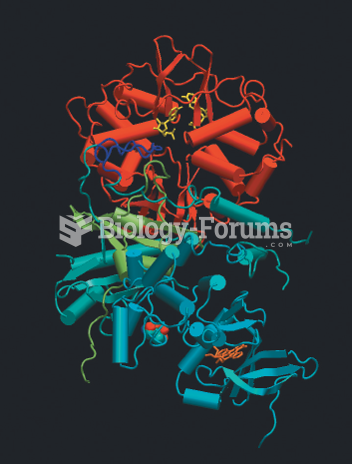|
|
|
Earwax has antimicrobial properties that reduce the viability of bacteria and fungus in the human ear.
The immune system needs 9.5 hours of sleep in total darkness to recharge completely.
Patients should never assume they are being given the appropriate drugs. They should make sure they know which drugs are being prescribed, and always double-check that the drugs received match the prescription.
In the United States, there is a birth every 8 seconds, according to the U.S. Census Bureau's Population Clock.
An identified risk factor for osteoporosis is the intake of excessive amounts of vitamin A. Dietary intake of approximately double the recommended daily amount of vitamin A, by women, has been shown to reduce bone mineral density and increase the chances for hip fractures compared with women who consumed the recommended daily amount (or less) of vitamin A.







